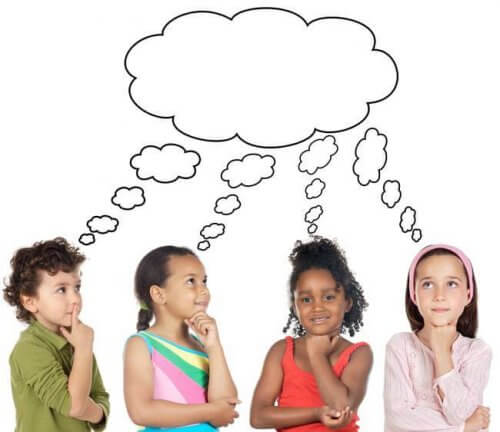Children's Riddles and Their Multiple Benefits


Written and verified by the psychologist María Alejandra Castro Arbeláez
Solve this riddle… Many moments of games and laughter among children have begun with this phrase. What are the benefits of playing riddles with our children? In the following article, we want to tell you how important easy children’s riddles are for the development of little ones.
Children’s riddles offer much more than just entertainment for our children. Telling riddles isn’t only connecting with them during playtime but also helping them to open their minds to the world of imagination, ingenuity, and curiosity.
A riddle is a problem to be solved in which clues are offered within the very sentence that forms the riddle. The format of children’s riddles doesn’t have to be through oral expression; we can also find riddles in books, paintings, photographs, and many other formats.
The origin of the riddles
There’s no record of the moment in which the first riddle appeared but examples do appear in multiple writings from ancient times.
In addition, riddles form part of a multitude of myths and legends, such as the riddles that the Sphinx sets before Oedipus as he enters the city of Thebes. We cannot forget that riddles also appear in the world of novels and cinema. For example, in The Hobbit or in The Neverending Story, there are scenes based on riddles.

The benefits of children’s riddles
Have you ever wondered how much it helps your children to play riddles? Let’s take a look at some of the main benefits.
Entertainment
This is undoubtedly the main purpose of riddles. They’re especially attractive because they require nothing more than imagination. Fun and learning are assured simultaneously.
Helping in the formation of concepts
When children are learning new things, concepts are formed in their heads that give a general definition to these elements. Riddles help add detail to those concepts.
I have needles but I can’t sew. I have numbers but I can’t count. A WATCH
Stimulating the imagination
Guessing involves making a mental picture of the details contained in the riddle. This implies that we let our imagination elaborate and give shape to the information received.
Increasing the capacity to learn
As they’re usually elaborated in the form of rhyme, they add an extra learning point for our little ones, forcing them to make a little extra effort in the challenge of understanding the message thus exposed.
In this regard, they increase your child’s cognitive development and capacity for deduction, favor problem-solving strategies, and promote memory.
All 7 are siblings and live only one day. When one is born, another dies, and so they spend their lives. THE DAYS OF THE WEEK
“Children also experience poetry through riddles, which are related to an essential aspect of human nature: Curiosity”
– Carolina Merino Risopatrón –
Enriching vocabulary
Riddles are descriptions with poetic touches, and this helps our children to increase their lexical wealth. And with the discovery of new words, the love for language grows.
The lexicon has, as we know, a semantic load, but also a socio-cultural load, which is the sum of history, thought, religion, traditions, morals, etc. As Juan Sáncez says in a study on riddles in Jaen, “lexical analysis goes beyond the word itself and tends to the cultural reality of the group of speakers”.
I have a head much smaller than my long neck. People who play with me pick at me, and that’s fine. What am I? A GUITAR
Encouraging critical thinking
Relating data and eliminating unimportant elements to get an answer are steps of critical thinking, essential to deciphering a riddle.
Another essential aspect has to do with reading comprehension because, with riddles, children make inferences about the logical and textual relationships that are presented.
Children’s riddles provide emotional education
Developing patience, taking time to listen, learning to memorize, interpret, reason, pay attention, concentrate, understand articulated language, associate ideas, motivate oneself, and so on. It’s really a very complete pastime.
Strengthening family relationships
Word games weave within the family a complicity that only its members share. Language education through play and ingenuity is a way to explore the love of intelligence.
The complicity, trust, collective fun, enjoyment of shared time…, each game with your family will be a reaffirmation of the love and attachment you have for each other
Of course, it’s best to adapt their difficulty to the age of your children. As they grow up, you can find new riddles that pose new challenges for them.

To get started in the world of riddles, it’s important that you explain to your children what the game consists of. The easiest way to adapt riddles is to divide them into themes. That is, parts of the body, plants, family, etc. This way, the children will know the theme of the riddle and will look for the answer there.
More about children’s riddles…
One of the advantages of riddles is that you don’t need money or electronic devices and you can play at any time or in any situation. A riddle before bedtime, in the car on the way to school, in the park, at lunchtime… whenever and wherever.
Whenever you have a few minutes to propose a riddle and its possible answers, you’ll be developing an activity based on the ingenuity, insight, and intelligence of your little ones.
Studying some of them and learning them by heart in order to propose them in any of the situations described will keep your little ones in a state of cognitive alertness.
Grandson of your great-grandfather, father of your siblings, uncle of your cousins, and brother of your aunts and uncles. YOUR FATHER
Riddles: Food for neuronal plasticity
Thanks to the fact that the brain of the youngest children is prepared to receive all kinds of information and adapt quickly to new situations and challenges, you’ll see that very soon it’ll be your child who’ll be interested in this type of activity and will be in charge of collecting new riddles for you to solve as well.
The idea is to know how to take advantage of children’s sensitive periods to encourage learning by creating an environment rich in stimuli that enhance their exploratory behavior.
Indeed, as the researcher Carolina Merino points out, it’s around the age of four that “the maturation of the functions of verbal logical thinking begins, based on the incipient ability to establish causal relationships through language and to develop hypotheses”.
If you have the necessary desire, you can make children’s riddles a good way to exchange curiosities and work the mind.
Solve this riddle… Many moments of games and laughter among children have begun with this phrase. What are the benefits of playing riddles with our children? In the following article, we want to tell you how important easy children’s riddles are for the development of little ones.
Children’s riddles offer much more than just entertainment for our children. Telling riddles isn’t only connecting with them during playtime but also helping them to open their minds to the world of imagination, ingenuity, and curiosity.
A riddle is a problem to be solved in which clues are offered within the very sentence that forms the riddle. The format of children’s riddles doesn’t have to be through oral expression; we can also find riddles in books, paintings, photographs, and many other formats.
The origin of the riddles
There’s no record of the moment in which the first riddle appeared but examples do appear in multiple writings from ancient times.
In addition, riddles form part of a multitude of myths and legends, such as the riddles that the Sphinx sets before Oedipus as he enters the city of Thebes. We cannot forget that riddles also appear in the world of novels and cinema. For example, in The Hobbit or in The Neverending Story, there are scenes based on riddles.

The benefits of children’s riddles
Have you ever wondered how much it helps your children to play riddles? Let’s take a look at some of the main benefits.
Entertainment
This is undoubtedly the main purpose of riddles. They’re especially attractive because they require nothing more than imagination. Fun and learning are assured simultaneously.
Helping in the formation of concepts
When children are learning new things, concepts are formed in their heads that give a general definition to these elements. Riddles help add detail to those concepts.
I have needles but I can’t sew. I have numbers but I can’t count. A WATCH
Stimulating the imagination
Guessing involves making a mental picture of the details contained in the riddle. This implies that we let our imagination elaborate and give shape to the information received.
Increasing the capacity to learn
As they’re usually elaborated in the form of rhyme, they add an extra learning point for our little ones, forcing them to make a little extra effort in the challenge of understanding the message thus exposed.
In this regard, they increase your child’s cognitive development and capacity for deduction, favor problem-solving strategies, and promote memory.
All 7 are siblings and live only one day. When one is born, another dies, and so they spend their lives. THE DAYS OF THE WEEK
“Children also experience poetry through riddles, which are related to an essential aspect of human nature: Curiosity”
– Carolina Merino Risopatrón –
Enriching vocabulary
Riddles are descriptions with poetic touches, and this helps our children to increase their lexical wealth. And with the discovery of new words, the love for language grows.
The lexicon has, as we know, a semantic load, but also a socio-cultural load, which is the sum of history, thought, religion, traditions, morals, etc. As Juan Sáncez says in a study on riddles in Jaen, “lexical analysis goes beyond the word itself and tends to the cultural reality of the group of speakers”.
I have a head much smaller than my long neck. People who play with me pick at me, and that’s fine. What am I? A GUITAR
Encouraging critical thinking
Relating data and eliminating unimportant elements to get an answer are steps of critical thinking, essential to deciphering a riddle.
Another essential aspect has to do with reading comprehension because, with riddles, children make inferences about the logical and textual relationships that are presented.
Children’s riddles provide emotional education
Developing patience, taking time to listen, learning to memorize, interpret, reason, pay attention, concentrate, understand articulated language, associate ideas, motivate oneself, and so on. It’s really a very complete pastime.
Strengthening family relationships
Word games weave within the family a complicity that only its members share. Language education through play and ingenuity is a way to explore the love of intelligence.
The complicity, trust, collective fun, enjoyment of shared time…, each game with your family will be a reaffirmation of the love and attachment you have for each other
Of course, it’s best to adapt their difficulty to the age of your children. As they grow up, you can find new riddles that pose new challenges for them.

To get started in the world of riddles, it’s important that you explain to your children what the game consists of. The easiest way to adapt riddles is to divide them into themes. That is, parts of the body, plants, family, etc. This way, the children will know the theme of the riddle and will look for the answer there.
More about children’s riddles…
One of the advantages of riddles is that you don’t need money or electronic devices and you can play at any time or in any situation. A riddle before bedtime, in the car on the way to school, in the park, at lunchtime… whenever and wherever.
Whenever you have a few minutes to propose a riddle and its possible answers, you’ll be developing an activity based on the ingenuity, insight, and intelligence of your little ones.
Studying some of them and learning them by heart in order to propose them in any of the situations described will keep your little ones in a state of cognitive alertness.
Grandson of your great-grandfather, father of your siblings, uncle of your cousins, and brother of your aunts and uncles. YOUR FATHER
Riddles: Food for neuronal plasticity
Thanks to the fact that the brain of the youngest children is prepared to receive all kinds of information and adapt quickly to new situations and challenges, you’ll see that very soon it’ll be your child who’ll be interested in this type of activity and will be in charge of collecting new riddles for you to solve as well.
The idea is to know how to take advantage of children’s sensitive periods to encourage learning by creating an environment rich in stimuli that enhance their exploratory behavior.
Indeed, as the researcher Carolina Merino points out, it’s around the age of four that “the maturation of the functions of verbal logical thinking begins, based on the incipient ability to establish causal relationships through language and to develop hypotheses”.
If you have the necessary desire, you can make children’s riddles a good way to exchange curiosities and work the mind.
All cited sources were thoroughly reviewed by our team to ensure their quality, reliability, currency, and validity. The bibliography of this article was considered reliable and of academic or scientific accuracy.
- Gómez, M. E. (2003). Adivinanzas: un recurso didáctico para la enseñanza del lenguaje. Educere, 6(20), 430-434. https://www.redalyc.org/pdf/356/35662010.pdf
- Merino Risopatrón, C. (2015). Poesía en los primeros años de la infancia: la relevancia de su inclusión en la escuela. Innovación educativa (México, DF), 15(67), 135-151. https://www.scielo.org.mx/scielo.php?script=sci_arttext&pid=S1665-26732015000100008
- Ramírez Mallqui, O. E. (2019). Programa de juegos verbales: adivinanzas y rimas para desarrollar la expresión oral de los niños y niñas de 4 años de la Institución Educativa Inicial N° 232 distrito de Cátac, provincia de Recuay, Región Ancash, 2017. http://repositorio.unprg.edu.pe/handle/UNPRG/4465
- Saavedra Medina, O. E. (2019). Aplicación de Estrategias Juegos Verbales Adivinanzas y Canciones para mejorar la expresion oral en niños y niñas de cuatro años de la IEI Carhuacushma, Cachachi, Cajabamba, Cajamarca, 2016. http://190.116.36.86/bitstream/handle/UNC/3781/T016_40107700_T.pdf?sequence=1&isAllowed=y
- Sánchez Prieto, J. F. (2020). El léxico de la adivinanza popular de Jaén. https://tauja.ujaen.es/handle/10953.1/12226
- VALLEJO, L. C. (2018). Adivinanzas y comprensión lectora. http://ri-ng.uaq.mx/bitstream/123456789/291/1/RI004845.pdf
- Vidal-Catalá, P. (2014). Léeme-léete: la educación emocional a través de la literatura (Bachelor’s thesis). https://reunir.unir.net/bitstream/handle/123456789/2490/vidal.catala.pdf?sequence=1&isAllowed=y
This text is provided for informational purposes only and does not replace consultation with a professional. If in doubt, consult your specialist.








